
If I have to think of popular recipes that use Basil, the first two that spring to mind are Pesto (Italy) and Green curry paste (Thailand) from two of my absolute favourite cuisines. Now in the days when I knew very little about Basil and my love for all things Thai began, I used ‘Italian’ Basil to make all my Thai curry pastes – they all turned out great. I was at home in Nigeria then so basically, I was thankful that I could lay my hand on herbs and hardly complained about what I could or couldn’t get.
That was several years ago though and in that time, I’ve gone from making green curries to experimenting with Pesto. And men, am I truly in love – all thanks to Jamie who made it so easy to rustle up.
Now Basil is one of the world’s oldest and most popular spices. In India, large bushes of basil grow around Hindu temples and are considered ‘holy’. Thus, not for consumption! The Greeks, great discoverers as they were, used Basil as flu medicine and eyedrops (mixed with wine!)
#1. There are many varieties of basil
O. Basilicum aka sweet basil is the variety of basil used in Italian cooking. From Pesto to Caprese, Pasta to Tomato sauces, no cucina italiano is complete without it. Its leaves are fresh, fragrant and floppy with a strong smell. There’s nothing strange about its green stems.
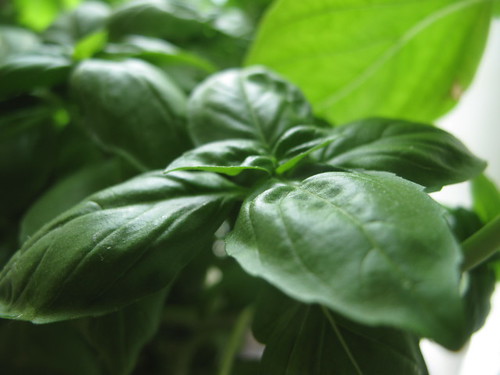
You also have a sweet thai basil variety with dark green, glossy leaves, purplish stems and an aniseedy-liquorice flavour.
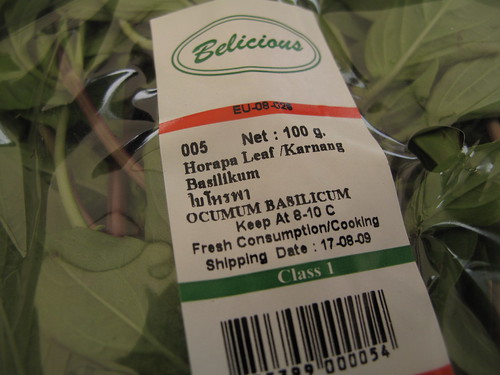
Then there’s holy basil (O. grattissimum or sanctum), which has a ‘hot’, peppery flavour and lemon basil…. which has a lemony/lime flavour! I’ve also heard of cinnamon basil but have never seen it!
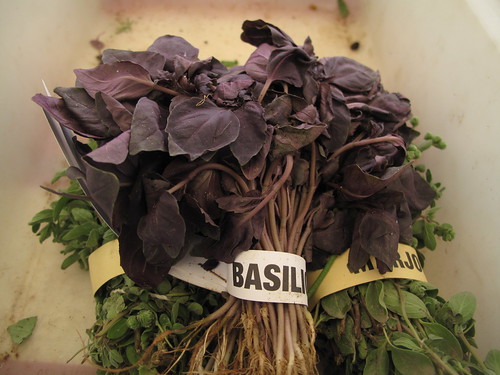
#2. Storing basil
Basil is a fairly delicate herb – its leaves are not as sturdy as parsley leaves or hardier herbs like rosemary etc so treat it a bit kindly. If you buy it fresh, wrap it up in a damp paper towel and place it in the warmest part of your refigerator, where it should keep for up to 5 days. Alternatively, blitz it up and freeze….much better than drying or buying dried, which is essentially flavourless. Sorry to say, but its true!
#3. Cooking with basil
While all types of basil enhance cook dishes, sweet basil is the only variety I’ve had raw – sprinkled on salads, tossed with pasta, pounded to make pesto.
It is worth noting that if cooking with basil, it is best to add to the dish towards the end as its delicate flavour is lost when over-heated.
I’ll share my pesto recipe and some ways to use it.
Ingredients
1 handful of flaked almonds, dry-roasted 3 handfuls of basil, washed (or combined with parsley) 1 clove of garlic pinch of salt 50g or less, grated Parmesan cheese 1/2 a cup Olive oilHow to
First of all, dry-fry a handful of flaked almonds in a frying pan. When the nuts are ready, out of the pan they come and unto a plate to cool down.
Then set out three handfuls of washed basil and parsley leaves (and some stalks) – going against tradition is allowed. (In my case, my basil plant had been subjected to numerous pluckings and needed recovery time. In the meantime, I had loads of Parsley and decided to use that as well).
Into the mortar goes a clove of garlic and 1/4 of a teaspoon of salt and then the leaves on top.
Proceed to pound it all together in the mortar or feel free to do it in a food processor…… which you’ll have to clean up :-). (I succeeded in creating mushy leaves and so forged ahead). When leaves are all bashed up, tip them out into a bowl and make progress.
If you have some Parmigiano Reggiano (Parmesan cheese), by all means use it. However, I have also made this with soft grated cheese – Gouda to be precise. For me, any sort of grated cheese would go. No need to be ‘extremely’ purist.
The Almonds go in the mortar and with a circular motion of the pestle, crush them….. to bits.
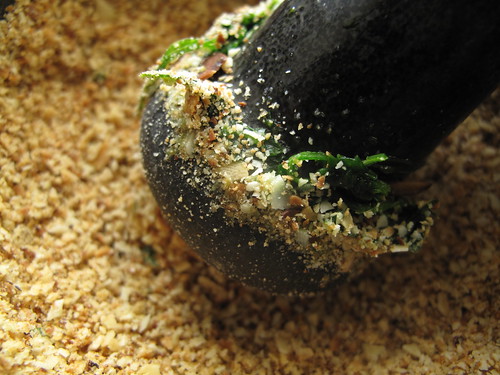
And then it’s time to mix them all together and loosen with about 1/2 a cup of oil to start with. If using a food processor, you’ll need to drizzle the oil in and that’s one area you have to watch out for if you’re using extra virgin olive oil.
Extra-virgin olive oil contains bitter tasting polyphenols coated by fatty acids, which prevent them from dispersing. If the oil is emulsified in a food processor, these polyphenols get squeezed out and the liquid mix turns bitter ( as read here).
I haven’t used it in my previous pestos but I suffered through the bitterness of minted pea puree so I understand the phenomenon all too well. So another thumbs up for making it by hand. Sorry Kitchen Aid … I don’t have one yet. As in a Kitchen Aid. I have a food processor but not the ‘Kitchen Aid’. Hmmm, time should repair all that.
I used regular plain olive oil, others use Rapeseed/Grapeseed oil and still some use salad oils and the like. Go with what you know and like but preferably something along these lines. And moving on, put the crushed almonds and 1/3 of the grated cheese into the bowl with the leaves and drizzle in 1/4 cup of oil to start off with.

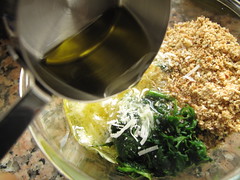
Give a good stir and alternating, add the cheese and oil till you get your desired consistency

The carefully spoon it into a clean jar or bowl, don’t worry about sterilising since its not going into the store cupboard – only the fridge.
Now what can you do with it?
Well, you could eat it with breadsticks, straight out of the jar

or plonk a dollop in a pasta salad
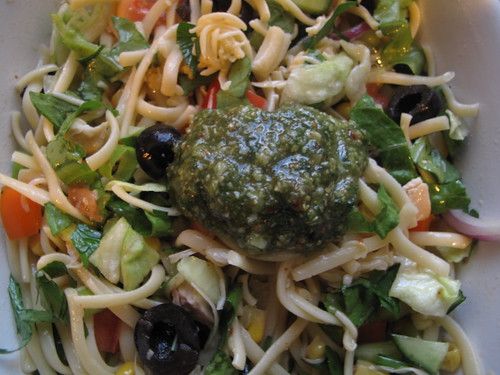
Then again, using it as a baste on fish is a terrific idea

From Traditional ‘caprese’ …to new-age caprese…
However you decide to use it, do enjoy it and let me know what you think!
Also, if you know more or I went wrong somewhere, enlighten us, please!
This post is especially for Weekend Herb blogging #203, hosted by Marija of Palachinka and managed by Haalo from Cook (almost) Anything At Least Once . To join the event, see the rules here.
[wpurp-searchable-recipe]Cooking with herbs: Basil – – – [/wpurp-searchable-recipe]








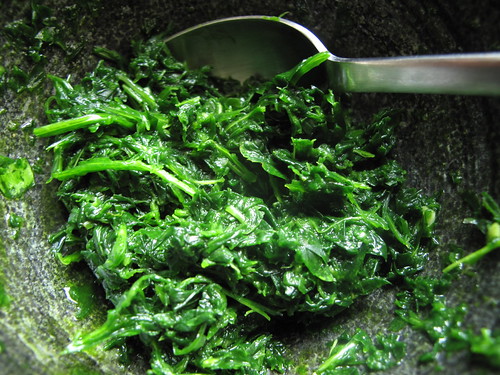




Leave a Reply